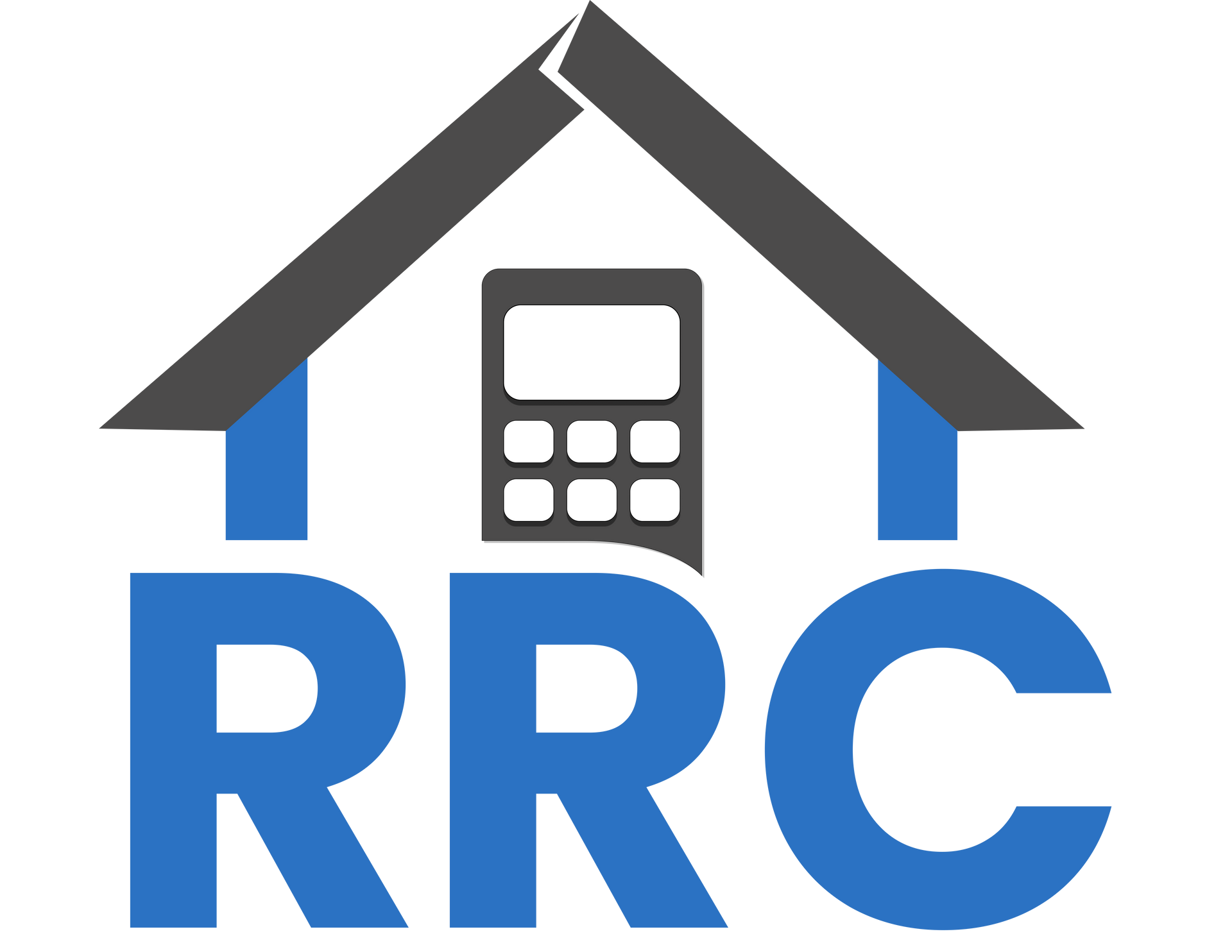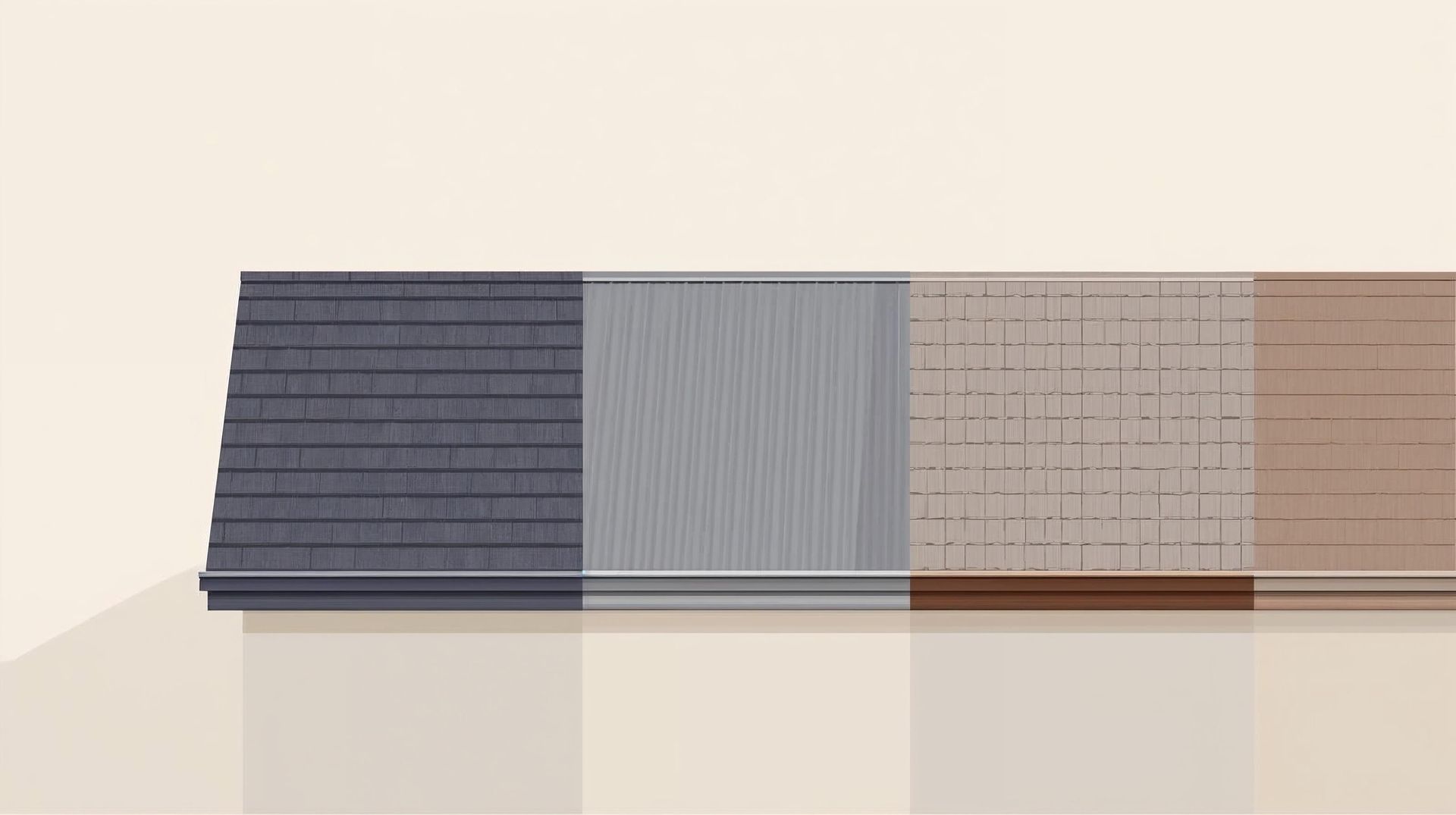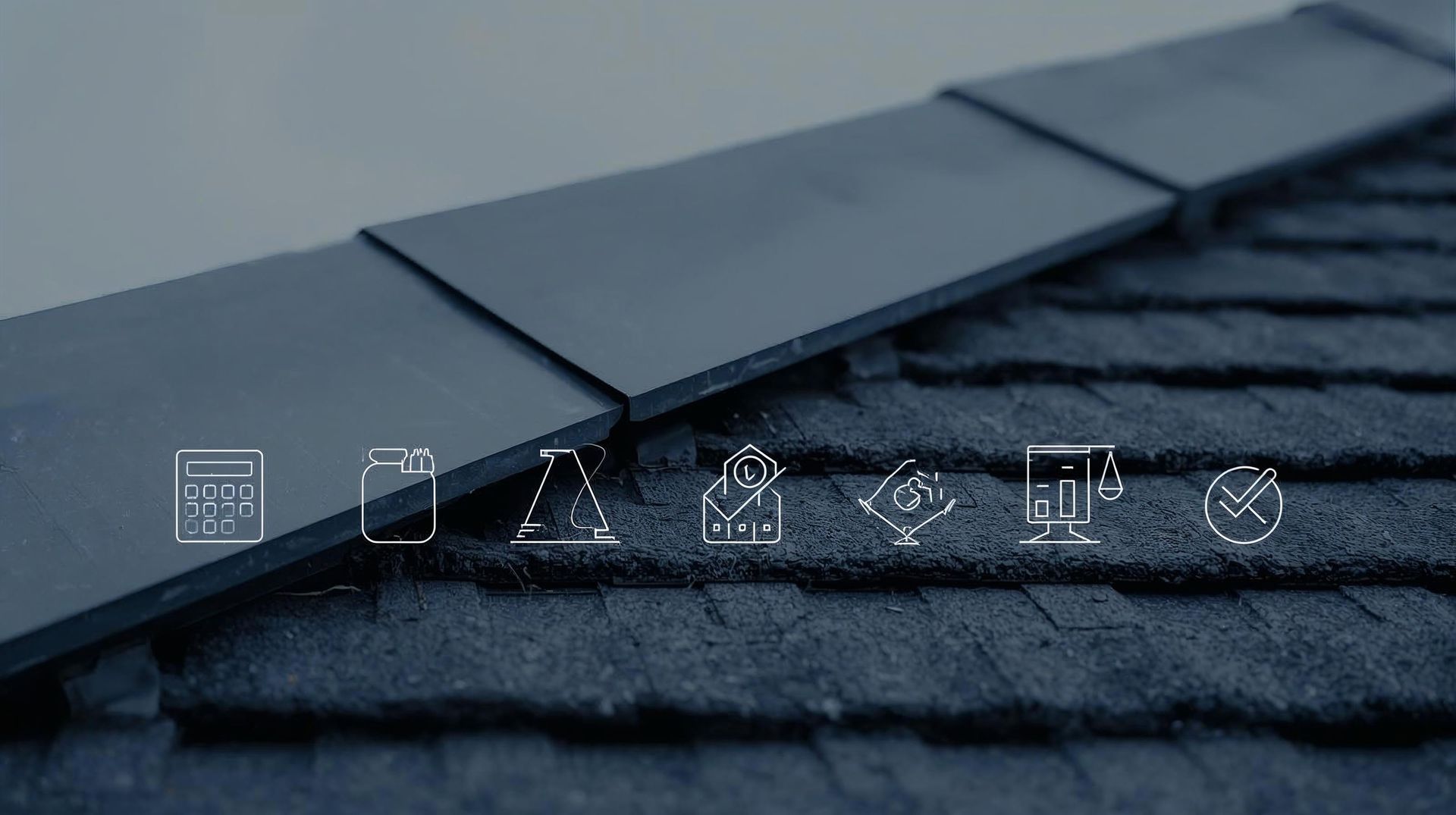You need a new roof, and your budget is tight. It’s a stressful position for any homeowner, often filled with questions about the actual cost and the fear of a massive, unexpected bill. The good news is, an affordable roof replacement is possible without sacrificing quality or your peace of mind.
Getting the cheapest roof isn't about cutting corners; it's about being informed and strategic. This comprehensive guide is designed to be your trusted resource, cutting through the noise with clear, data-driven advice.
We’ll walk you through the most budget-friendly roofing materials, reveal smart ways to hire a reputable roofing contractor without overpaying, and explore financial strategies that can make this necessary investment manageable. These are the actionable strategies that can help you save money.
Key Takeaways
Before we dive in, here are the most important points to remember from this guide:
- Smart Spending is Key:
The cheapest roof replacement isn't about cutting corners; it's about making informed decisions to get the best long-term value.
- Material is Your Biggest Cost Control:
Your choice of roofing material is the #1 driver of the final price. Architectural asphalt shingles typically offer the best balance of cost, durability, and appearance for a budget-friendly project.
- Always Get Multiple Quotes:
The single most effective way to save money is to get at least 3-5 detailed, competing estimates from reputable roofing contractors. This ensures you pay a fair market price.
- Timing Can Save You Money:
You can often get a 5-10% discount by scheduling your project during the roofing industry's slow season (winter or mid-summer).
- Explore All Payment Options:
Before paying out of pocket, check if your insurance company will cover storm damage. If you need a loan, compare a home equity loan or personal loan to avoid high-interest credit card debt.
- Repair vs. Replace:
A simple roof repair is a cheaper option for localized or minor damage on a younger roof. A full replacement is the better financial choice for an old or widely failing roof.
- Use a Calculator for a Real Budget:
For the most accurate estimate based on your home's specific details, use a Roofing Cost Calculator before you start calling contractors.
Ready to see how these factors impact your budget? Get a real number you can plan with. Use Our Free Roofing Cost Calculator for a Personalized Estimate Now
The Cheapest Way to Replace a Roof (Without Cutting Corners)
A roof replacement is one of the biggest financial decisions a homeowner can make, with the average price often falling between $8,500 and $14,500.
When you're trying to find the cheapest way to replace a roof, the goal isn't just to get the lowest possible quote—it's to get the best possible value. This guide is your step-by-step playbook for navigating the process on a tight budget.
We will dive deep into the most budget-friendly roofing materials, break down how to find a reputable roofing contractor who fits your budget, and uncover every proven method for lowering the final roof cost of your new roof.
The #1 Way to Control Your Roof Replacement Cost: Choose the Right Material
The single (or should I say shingle) biggest factor that determines your total cost is the roofing material you put on your home. This choice alone can swing your final bill by tens of thousands of dollars. If you're working with a tight budget, focusing on this choice is the most critical step in controlling your expenses. Here’s a look at the numbers behind the most affordable materials.
The Gold Standard for Budget Roofing: Asphalt Shingles
There's a reason more than 70% of homes in the USA have an asphalt shingle roof: they represent the most affordable and accessible roofing material on the market. If your primary goal is to save money on the upfront cost, this is your answer. However, even within this category, there's a key choice to make that balances cost and long-term value.
- Asphalt Shingles:
This is the undisputed champion of low-cost roofing. They are single-layer shingles with a flat, uniform appearance.
- Cost:
As of 2025, you can expect the installed cost per square foot for standard 3-tab asphalt shingles to be between $4.25 and $7.15 per square foot. This makes them the most budget-friendly roofing material by a wide margin.
- Lifespan:
A properly installed 3-tab shingle roof has a typical lifespan of 15 to 20 years.
- The Verdict:
If the absolute lowest initial cost for replacing a roof is your only goal, this is the material for you. It provides basic, reliable protection at a price no other material can match.
- Architectural Asphalt Shingles (The "Best Value" Option):
For a moderate price increase, architectural shingles are a significant step up in quality and are still very cost-effective. They are thicker, laminated shingles that provide a richer, more textured look.
- Cost:
Expect the installed cost per square foot to be between $6.00 and $10.50. While more expensive than 3-tab, it's still far below metal roofing.
- Lifespan:
Their increased thickness and durability give them a lifespan of 25 to 30 years, sometimes longer.
- The Verdict:
For most homeowners, this is the true sweet spot. You pay roughly 20-40% more money upfront, but you get a roof that lasts 50% longer and has increased durability against wind. Over the long term, this is often the smarter financial choice.
The Long-Term Value Play:
Is Metal Roofing Worth the Upfront Cost?
You'll often hear about metal roofing as a "lifetime" solution, and it's true that it offers incredible longevity. But can it be considered for a budget-conscious homeowner? Only if you're playing the long game.
- Cost:
The upfront cost of a metal roofing system is significant, typically ranging from $8.00 to over $30.00 per square foot installed. This is often two to four times the cost of an asphalt shingle roof.
- Lifespan:
Metal roofs are incredibly durable, lasting 40 to 70+ years.
- The Long-Term Math:
A metal roof might cost you $20,000, while an architectural shingle roof costs $10,000. However, you'll likely need to replace that asphalt roof again in 30 years, costing another $10,000 (or more, with inflation).
Over a 50-year period, the total cost can be similar, but metal saves you the hassle of a second roof replacement. If you plan to be in your home for decades, it's a smart investment, but it is not the cheapest way to replace a roof today.
High-Cost Materials to Avoid on a Tight Budget
One of the most effective ways to save money is to focus only on budget-friendly materials. While options like slate, clay, and wood are known for their durability and beauty, their significant material costs and complex installation requirements will quickly inflate your project's price.
Want to play with the numbers? Our Roofing Cost Calculator is the perfect tool to compare how different materials will impact your project's cost.
How to Find a Reputable Roofing Contractor Without Overpaying
After materials, labor costs are the next biggest part of your bill. The roofing company you choose has a massive impact on both quality and cost. To get a great deal without sacrificing peace of mind, focus on these key strategies:
- Always Get Multiple Quotes: Don't take the first offer. Getting 3-5 detailed quotes from different roofing contractors is the single best way to understand the fair market price and save money.
- Leverage the Off-Season:
Schedule your project during the slow season (winter or mid-summer). Roofing companies are less busy and often offer discounts of 5-10% to keep their crews working.
- Vet Your Contractor Carefully: Watch out for suspiciously low bids. They often come from contractors who aren't properly licensed and insured, which is a massive financial risk for you. Always verify their credentials.
- Insist on an Itemized Contract: A vague contract leads to surprise fees. Demand a written contract that details all material costs, labor charges, and cleanup fees to protect yourself from unexpected expenses.
- Never Pay in Full Upfront: A reputable roofing contractor will require a reasonable deposit (10-30%) for materials. If a contractor demands 50% or more upfront, consider it a major red flag.
Smart Financial Strategies for Your New Roof
Figuring out how to pay for your new roof is a huge piece of the puzzle, especially when you're trying to save money.
The good news is, you don't have to drain your savings account. Below are some ways to finance your project without adding extra financial stress.
Using Your Homeowner's Insurance for Roof Damage
Before you assume you're paying for everything, consider the reason your roof needs replacing. If it's simply old and has curled shingles from age, your policy most likely won't cover it.
However, if the roof damage is the result of a specific, covered event (like a hailstorm, major windstorm, or a fallen tree), your insurance company may be obligated to pay for a full replacement. Document the visible damage with photos and contact your insurance provider immediately to start the claims process.
Home Equity Loan vs. Personal Loan
Putting an entire roof replacement on a high-interest credit card is one of the most expensive mistakes you can make. A smarter approach is to secure dedicated financing.
- Personal Loan:
These are often unsecured and can have fixed (and higher) interest rates (e.g., 8-15% ), making your payments predictable. They are a good option if you don't have significant equity in your home.
- Home Equity Loan (HELOC): If you have equity built up, a HELOC often offers a lower interest rate (e.g., 7-12% in 2025) because your home secures it. This can be one of the cheapest ways to borrow more money for a major home improvement project.
Many roofing companies also offer their own financing options. Be sure to compare the interest rates and terms of all these choices to find the one that adds the least amount to your overall cost.
Finding Financial Aid: Grants and Programs for Low-Income Homeowners
For homeowners with limited financial resources, there are programs that can help. The U.S. Department of Energy’s Weatherization Assistance Program (WAP), for example, helps low-income homeowners improve energy efficiency, which can sometimes include roof repair or replacement.
Additionally, you can check the DSIRE database (Database of State Incentives for Renewables & Efficiency) for any state-specific grants or low-interest loans you may qualify for.
More Pro Tips to Save Money on Your Roof Replacement
Beyond the big three of materials, labor, and financing, there are a few more key decisions that can help you protect your budget.
Roof Repair vs. Full Replacement: Making the Right Financial Call
Sometimes the most affordable roof replacement is no replacement at all—yet. If your roof is relatively young (under 15 years) and the roof damage is localized, a roof repair can be a perfectly viable and much cheaper option.
This is ideal for issues like a small, contained leak or a few missing shingles from a windstorm. However, a roof repair is just a band-aid if the problems are widespread.
If the entire roof is old and brittle, you see water stains appearing in multiple rooms, or you have serious structural issues, a full replacement is the only sound long-term solution.
Realistic DIY: What You Can Actually Do to Lower Labor Costs
While a full DIY roof replacement is too risky for most, you can potentially lower labor costs by taking on specific tasks. Talk to your roofing contractor about the possibility of you handling the tear-off of the existing shingles on a garage or shed.
This is messy, hard work, but it could save you money. You could also offer to handle the final job site cleanup and debris hauling. Not all contractors will agree to this, but it's always worth asking if it can reduce the final bill.
Never attempt a DIY roof replacement with a family member unless they are a certified professional roofer.
The Final Step: From Ballpark Guess to a Real Budget
We've covered several factors that influence the cost of a new roof, from the size of your roof to seasonal timing. All these tips help you form a general idea of your potential expenses. But to create a real, actionable budget that you can plan around, you need a specific number. A ballpark guess isn't enough when you're preparing for a major home improvement project.
This is where our Roofing Cost Calculator becomes your most valuable tool. Before you even call a contractor, you can get a detailed, personalized estimate based on your home's square footage, location, and preferred materials. It's the fastest, most accurate way to build a budget you can trust.
Conclusion: An Affordable, Quality Roof is Within Reach
Finding the cheapest way to replace a roof is not about taking risky shortcuts; it’s about being a strategic, well-informed homeowner. It’s about understanding that a safe roof is non-negotiable, but the price tag doesn't have to be overwhelming. By prioritizing a cost-effective roofing material like an asphalt shingle roof, diligently gathering multiple quotes, and exploring all your financial options, you can get a durable, high-quality new roof that protects your home without breaking the bank.
You have the knowledge, now get the numbers. A real budget starts with a real estimate.
Check out our calculator so you don't have to ring up multiple contractors to get an estimate.



